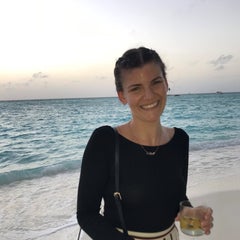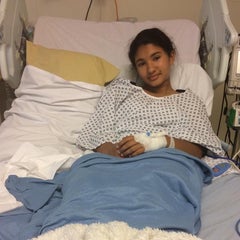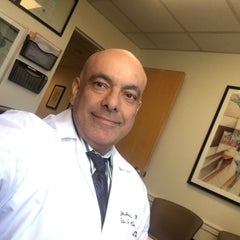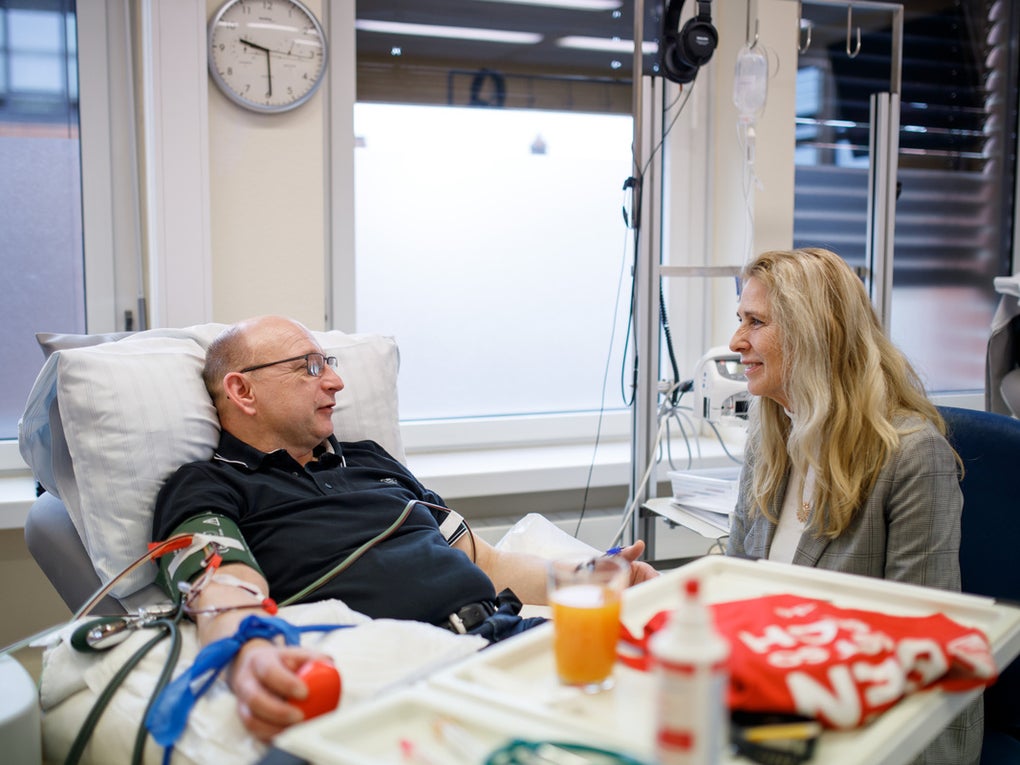
DKMS launches its first collection centre in Dresden, Germany
London, 3 April 2023
On 1 April 2023, the first collection centre operated by DKMS opened its doors in Dresden, Germany. This is a significant step for the international non-profit organisation dedicated to saving the lives of patients with blood cancer: The collection centre enables DKMS to guide stem cell donors along their entire journey – from their initial registration to the collection of their stem cells and follow-up care. This was made possible by outsourcing parts of the Cellex Collection Center Dresden to DKMS.
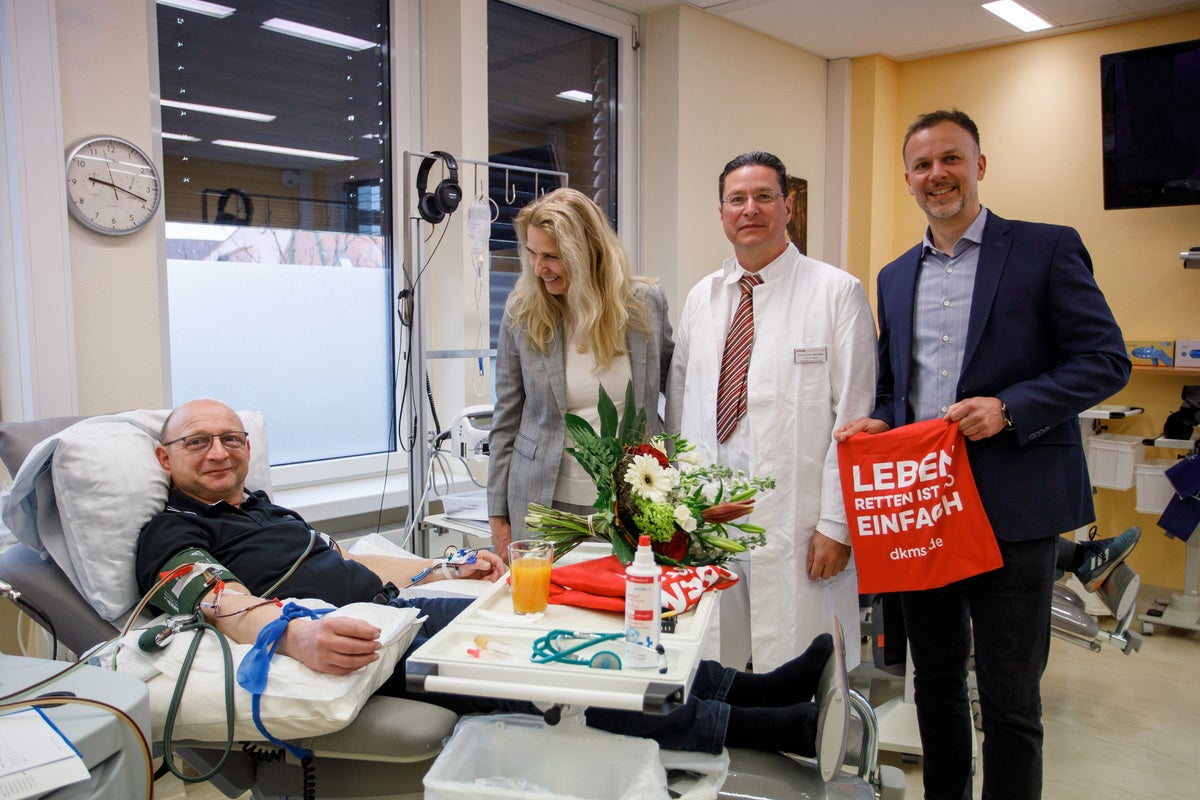
Donating stem cells to give a blood cancer patient a second chance at life is an incredible and selfless act of kindness. Out of over 11.5 million people registered with DKMS, more than 105,000 have donated stem cells in the past 32 years. More than 7,700 times each year - in the seven countries where DKMS is present. “We are deeply indebted to all the people who support our lifesaving mission and donate their stem cells. At DKMS, we want to make this unique experience for our donors as comfortable as possible. In addition to many valued partners who perform collections for us, we can now also take care of our donors ourselves and all along the way,” says Dr Elke Neujahr, Global Chief Executive Officer at DKMS and Chief Executive Officer of the DKMS Collection Center.
Experienced team of experts: Donors are in the best possible hands
In the past months, the transfer of parts of the Cellex Collection Center in Dresden to DKMS was planned and implemented. This has now started its work as a non-profit organisation on 01 April 2023. In the coming months, this will also take place at the Cologne location. “Cellex has been our trusted partner for 20 years and has performed more than 50,000 stem cell collections for DKMS. We are glad to start operations today in Dresden with a dedicated team of experts and are looking forward to the launch of our collection centre in Cologne,” says Dr Elke Neujahr.
DKMS and Cellex share a very long history. In 2001, Professor Gerhard Ehninger, the co-founder of DKMS, launched Cellex in Dresden and further established the collection centre in Cologne in 2009. “DKMS and Cellex worked hand in hand ever since to provide lifesaving stem cells from healthy donors. The transfer ensures that the successful work of the Cellex Collection Center will be continued by DKMS in the interest of all blood cancer and blood disorder patients worldwide,” says Professor Gerhard Ehninger, Managing Partner at Cellex Cell Professionals.
“Our goal is to provide the best possible service to our DKMS donors. It is a great opportunity for us to start the DKMS collection centre with such an experienced and reliable team. The safety and well-being of our donors have top priority,” says Sirko Geist, Chief Executive Officer of the DKMS Collection Center. The team in Dresden consists of excellent physicians and dedicated nurses. Together, they enable on average six peripheral stem cell collections daily and four bone marrow collections per week with the necessary care and attention and in compliance with the highest standards. After collection, couriers deliver the stem cells to transplant centres around the world.
Two ways to donate: peripheral stem cell and bone marrow donations
With the DKMS collection centre, the non-profit organisation extends its expertise in the areas of peripheral blood stem cell apheresis and bone marrow collection. The type of donation depends primarily on the patient's medical need or the resulting requirement. The patient's treating physician decides which collection procedure to choose based on various criteria. For example, the type of disease may play a role: Some blood cancers are better treated with a bone marrow donation, others with a peripheral blood stem cell donation.
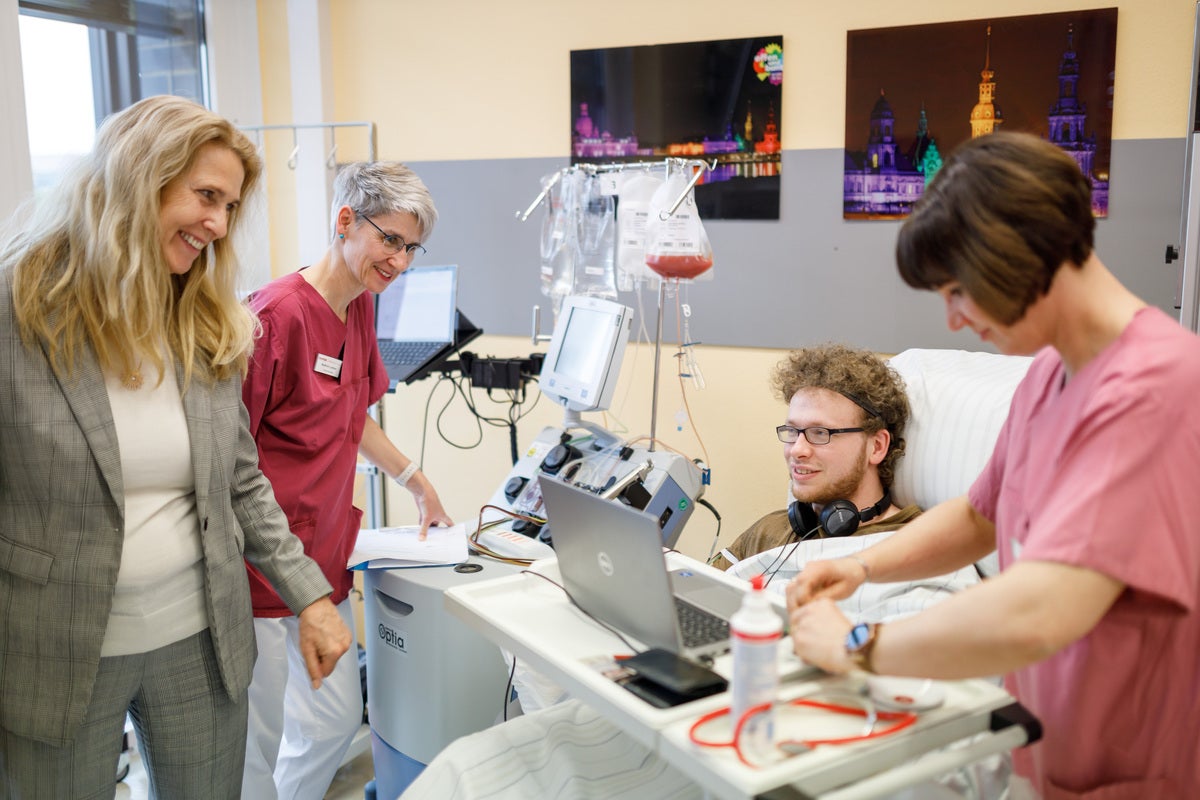
Peripheral blood stem cell collection (PBSC) is the most common method, used in around 90 percent of cases. PBSC involves the doctor placing a special intravenous line in each arm vein, much like giving blood. It is performed on an outpatient basis in the practice rooms and usually takes between three and five hours at the most. During the procedure, donors can pass the time playing computer games, watching movies or TV series, listening to music, audiobooks and podcasts or reading e-books, magazines or newspapers.
For bone marrow collections sufficient beds and operating room capacities are available as stem cells are taken from the iliac crest of the pelvis under a general anaesthetic. In addition, if necessary for further treatment of the patient, lymphocyte collections can also be performed. Each collection is carried out in compliance with the highest standards.
Expansion of collection capacities
DKMS cooperates with several certified collection centres. Also, in the future, the organization will continue to work together with them in a trustful partnership to ensure that patients are given a second chance at life. Because: worldwide, every 27 seconds someone is diagnosed with a form of blood cancer. Many patients cannot survive without a life-saving stem cell donation and for many every day counts. Thus, it is crucial that sufficient capacities for stem cell collection are available. “With the DKMS collection centre, we want to meet increasing requests to make sure that patients receive the donated cells when they need them. We are therefore planning to expand our capacities and will move to new and larger premises in Dresden this year,” highlights Sirko Geist.
Later this year, DKMS is going to hold a celebratory opening of the two DKMS collection centres in Dresden and Cologne.
For further information
Press contact: DKMS – Global Corporate Communications – Julia Schmitz – T +49 (0)221 940582 3241 – jschmitz@dkms.de – http://www.dkms.org.
ENDS
About DKMS
DKMS is an international non-profit organisation dedicated to saving the lives of patients with blood cancer and blood disorders. Founded in Germany in 1991 by Dr. Peter Harf, DKMS and the organization’s over 1,000 employees have since relentlessly pursued the aim of giving as many patients as possible a second chance at life. With over 11.5 million registered donors, DKMS has succeeded in doing this more than 105,000 times to date by providing blood stem cell donations to those in need. This accomplishment has led to DKMS becoming the global leader in the facilitation of unrelated blood stem cell transplants. The organisation has offices in Germany, the US, Poland, the UK, Chile and South Africa. In India, DKMS has founded the joint venture DKMS-BMST together with the Bangalore Medical Services Trust. International expansion and collaboration are key to helping patients worldwide because, like the organization itself, blood cancer knows no borders.
DKMS is also heavily involved in the fields of medicine and science, with its own research unit focused on continually improving the survival and recovery rate of patients. In its high-performance laboratory, the DKMS Life Science Lab, the organization sets worldwide standards in the typing of potential blood stem cell donors.
